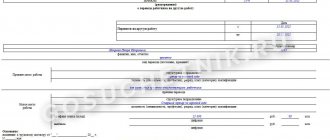Absenteeism, unfortunately, is a fairly common occurrence not only in educational institutions; it also happens in the workplace. Employers who are dissatisfied with the unjustified absence of an employee may refuse to continue to cooperate with the truant, dismissing him under the relevant article of the Labor Code. At the same time, in order for such a dismissal not to be challenged in the future, it is necessary to strictly comply with the administrative “regulations”, and most importantly, to correctly qualify absenteeism from the point of view of labor legislation.
Question: Is it legal to dismiss an employee who does not go to work during a period of downtime if the employer’s LNA does not indicate the employee’s right not to go to work during such a period? View answer
What is considered truancy?
According to the Labor Code of the Russian Federation, absenteeism is the absence of an employee at the workplace according to the work schedule without good reason.
It is recognized as a gross violation by the employee of labor discipline and the terms of the employment contract with the employer, as well as non-compliance with internal labor regulations. On our website you can familiarize yourself with the procedure for drawing up labor regulations and filling out this document. Read the article “Internal Labor Regulations – Sample 2021”.
What do modern employers understand by absenteeism? Of course, employees not showing up for work on time can cause a lot of trouble for company management. And employers often intimidate staff by dismissing them for being late for work, staying late after a lunch break, leaving work early, etc. But the situations listed above, as a rule, are not absenteeism.
Situations in which an employee’s absence from work (workplace) is recognized as absenteeism were considered by ConsultantPlus experts. If you have access to K+, go to the HR Guide; if you don't, get it for free.
On the other hand, the Labor Code of the Russian Federation does not have a clear list of valid reasons. Our legislators leave this issue to the discretion of the enterprise management. Apparently, the manager must independently assess the extent to which the reason for absence from work is valid. Valid reasons include illness, death of loved ones, natural disasters, road accidents, housing problems that require immediate solutions, etc. Each such absence must be confirmed by a sick leave certificate, a certificate from a medical institution, the traffic police, the housing management company, etc. d.
IMPORTANT! If an employee verbally warned the manager in advance about his absence from work, this will not be considered absenteeism. Especially when this fact can be confirmed by other employees of the enterprise - direct witnesses.
Employee absenteeism can create problems in the organization's activities, including financial ones. For example, a failure in the production process of an enterprise operating on a continuous cycle, an unsigned agreement for a major commercial transaction, as a result of which the enterprise could increase revenue, etc.
Possibilities for challenging dismissal and company liability
If the employer committed violations in the dismissal procedure, then the employee has every chance of being reinstated at work through the court. To do this, he can contact the arbitrators directly, or file a complaint with the State Tax Inspectorate or the prosecutor's office, which, if violations are identified, also have the right to initiate the investigation process. If unlawful actions of the employer are proven, he faces: • An administrative fine under Art. 5.27 of the Code of Administrative Offenses of the Russian Federation in the amount of 30,000 to 50,000 rubles. for companies and from 1,000 to 5,000 RUB. for individual entrepreneurs; • The need to reinstate the employee at work and pay him the average salary for the period of forced absence from the date of dismissal until the date of his return; • The employer may be required to compensate for moral damage to the injured employee. An employer should be especially careful when issuing disciplinary punishment in the form of dismissal. In case of mistakes, he can expect the negative consequences listed above.
Artyuk Anna Alexandrovna
Higher legal education. In 2001, she graduated from Far Eastern Federal University with a degree in Jurisprudence. Diploma DVS 0021766. Work experience in the legal profession for more than 20 years. Specializes in the field of civil, family, financial, labor, housing law.
Important conditions for recognizing absenteeism
In judicial practice, there are cases where truant workers won lawsuits due to incorrectly documented and undocumented fact of absenteeism and were reinstated at work. That is why the employer must carefully prepare all documents related to absenteeism. However, you should not do this retroactively. As practice shows, such facts are provable and the court will side with the employee who committed absenteeism.
In what cases is an employee’s absence from work regarded as absenteeism:
- If the employee is absent from the workplace during the entire work shift (even if it lasts less than 4 hours).
If the employee does not have a documented workplace and he was on the territory of the organization, the employer will not be able to give him official absenteeism. Conclusion: assign a workplace to each employee in the employment contract when he/she starts working.
- If the employee is absent from the workplace for more than 4 hours.
Moreover, if the employee was absent for exactly 4 hours, such absence will not be considered absenteeism.
- Absence from work for unexcused reasons.
The employee must confirm each absence from the workplace with supporting documents. For example, a sick leave certificate, a summons to court or for an inquiry, a certificate from a medical institution and other documents. At the same time, the employer has no right to fire a pregnant woman who has committed absenteeism.
- If the fact of absenteeism is proven.
Each absence must be documented. Otherwise, if the employee goes to court, justice will not be on the employer’s side.
Went on annual leave without permission
If an employee goes on annual leave without the required registration and without approval from his superiors, then you can be prepared for the fact that this can be defined as absenteeism. The decision of the courts proving the legality in this case is based on the fact that there is no evidence of the provision of the next vacation, its period has not been agreed upon, and the employee does not belong to the category for whom vacation can be used at a convenient time.
In this case, you should pay attention to the fact that if an employee goes on leave at his main place of work, this does not mean that he can go on part-time leave without approval and registration in the appropriate manner. This is confirmed by the judicial practice of the St. Petersburg City Court, where it was recognized that it was completely legal in a similar situation for the employer to fire a part-time worker for absenteeism.
Article 81 of the Labor Code of the Russian Federation in 2020-2021
In Art. 81 of the Labor Code of the Russian Federation, namely sub. “a” clause 6 states that in case of absenteeism, the employer can legally dismiss the employee. In this case, the conditions mentioned earlier must be met.
But should a manager always fire an employee for absenteeism? This article gives him the right to do this, but does not establish such an obligation. Legislators leave the right of choice to the company's management. It can reprimand the employee, reprimand him or simply leave absenteeism unattended.
In some cases, the dismissal of an employee is possible due to him going on unauthorized leave without warning management. Every enterprise must have an annual vacation schedule. It is brought to the attention of employees. Lack of a schedule is considered a violation of labor laws.
Find out how to properly create a vacation schedule and download the form on our website. Read the article “Vacation schedule - form and sample for filling out in 2021.”
But in any case, going on vacation without the approval of management is a violation of labor discipline, and the employee may be held accountable for absenteeism.
You may also find these articles useful:
- “How to properly arrange leave followed by dismissal?”;
- “Order for annual paid leave - sample and form”.
Sometimes it happens that absenteeism ends the employee’s desire to resign of his own free will. The employee writes a letter of resignation and, without working for 2 weeks, does not go to work at the scheduled time.
If an employer dismisses an employee for absenteeism, he makes a corresponding note in his work book with reference to Art. 81 Labor Code of the Russian Federation.
The absentee does not agree with the dismissal: can it be challenged?
Absenteeism is a violation so serious that even a single proven case is sufficient by law to dismiss the offender. After all, sometimes employee absenteeism can be fraught with serious unpleasant or even fatal consequences for the entire activity of the enterprise.
However, when dismissing on the basis of absenteeism, the employer must strive to avoid mistakes that could lead to challenging the dismissal in court. If the decision is positive, the plaintiff’s dismissal for absenteeism will be considered illegal.
Question: The employee presented the employer with a sick leave certificate for payment. When checking the authenticity of the sick leave certificate presented, it turned out that it was fake. Is it possible to fire an employee for absenteeism in this case? View answer
This entails the reinstatement of the dismissed person in his previous position with payment of salary for the entire period, from unfair dismissal to the end of the trial, and in some cases, compensation for moral damage. This, unfortunately for the employer, is possible if:
- the reason for dismissal for absenteeism was a fact that is not absenteeism as defined by legislative documents;
- the algorithm of actions during the dismissal procedure due to absenteeism was violated;
- There were errors and inaccuracies in the preparation of relevant documents.
Let's consider how to maintain accuracy in each of these points so that everything is flawless from the point of view of current legislation.
Question: An employee submitted a written application for three days of leave at his own expense in connection with the death and funeral of his brother. The General Director, who accepted the application, verbally authorized the granting of leave. However, the application does not contain a visa for the general director, and no order was issued to grant leave. The employee did not show up for work. Is an employee subject to dismissal for absenteeism? View answer
How to prove employee absenteeism
The main difficulty in documenting an employee’s absenteeism is to prove that the reason for his absence from the workplace is not valid. In some cases, an employee cannot notify the manager of his absence from work for objective reasons. For example, there was an emergency on the road, an employee was unexpectedly hospitalized in intensive care, etc.
IMPORTANT! There is no need to immediately prepare an order for dismissal or disciplinary action on the day of absenteeism. The main thing is to record the fact of a person’s absence from his workplace in the presence of several witnesses.
To do this, the HR department must draw up an employee absence report in any form on company letterhead. It is signed by witnesses who can confirm the situation. In addition, the act should indicate the place of preparation, the date and necessarily the exact time, the full name of the employee who compiled this document, as well as witnesses.
After the report is drawn up and before the reasons for the potential absentee’s absence from the workplace (if any) are clarified, o (failure to appear for unknown reasons) is entered in the work time sheet in form T-12 and T-13. In the future, if the employee submits supporting documents, he will be corrected, for example, to “B” (sick leave). If the employee does not have such documents, “PR” (absenteeism) is indicated.
An example of how absenteeism is reflected in a report card (in form T-13) was prepared by ConsultantPlus experts. Get free trial access to K+ and proceed to samples (including in excel format).
On our website you can find out the procedure for filling out time sheets, as well as download their forms. See articles:
- “Working time sheet according to form T-12 - form”;
- “Unified form T-13 - form and sample”.
When an employee appears at the workplace, he must be required to provide an explanatory note in writing about the reasons for absenteeism (in the absence of supporting documents). There are known cases where an employee fired for absenteeism filed a lawsuit against his employer for illegal dismissal and won the lawsuit.
Why can dismissal be considered illegal if the fact of absenteeism has been proven? The employee may refer to the last paragraph of Art. 192 of the Labor Code of the Russian Federation and the fact that the employer did not even inquire about the reasons for absenteeism and did not assess the severity of the offense and the circumstances of its commission.
IMPORTANT! In case of absenteeism, be sure to require a written explanation from the employee.
But there are cases when employees refuse to give an explanation of the reasons for absenteeism in writing. Then the employer should issue the employee, against signature, a notice of the need to provide an explanatory note. The document must indicate the number of days during which the employee must explain his absence. This is 2 working days (Article 193 of the Labor Code of the Russian Federation).
If the employee refused to receive the notice or did not provide an explanation after the specified time, this should also be recorded in an act in the presence of witnesses.
What is the punishment for truancy?
Punishments for absenteeism without good reason are stipulated in labor legislation.
Article 193 of the Labor Code regulates the procedure for issuing disciplinary sanctions.
Punishment for truancy can be expressed by the following actions:
- An employer may issue a reprimand for absenteeism at work.
- Or just make a remark for the first time.
- Monetary penalties may be applied in the form of fines, for example, deprivation of bonuses.
- The article for absenteeism also contains an extreme measure - dismissal.
It should be said that the choice of the measure of responsibility lies entirely on the shoulders of the employer; it is he who decides to scold the negligent employee and leave him or say goodbye to him.
To impose disciplinary sanctions, you should adhere to the basic rules for their application:
- The truant must give a written explanation of his actions.
- In the absence of an explanatory note, a commission act is drawn up, which sets out the fact of the person’s failure to appear or his refusal to work.
- An order for absenteeism is issued within one month from the moment the circumstances of the absence were clarified.
- Punitive measures must be taken within six months after the employee’s absenteeism was registered.
- Only one punishment can be applied for one offense. That is, a person is either deprived of a bonus, or reprimanded, or fired for absenteeism by order.
Please note that it is legal to not attend work without a valid reason. This right arises in the event of untimely payment of wages by the employer. If he is late with payment for 15 days or more, then he may not go to work until the debt is fully repaid. However, in this case, the employee is simply obliged to notify of his intention in a written statement and only after that can he leave work.
Documentation of employee absenteeism
So, we have figured out in what cases an employee’s absence from the workplace is considered absenteeism and how to prove it. How to document an employee’s absenteeism and its consequences?
The final decision on punishing an employee for absenteeism is made by the employer himself. An employee may be held liable for absenteeism in the form of:
- Layoffs. When dismissing someone for absenteeism, you do not need to draw up 2 orders - on imposing a disciplinary sanction and terminating the employment contract. An order to terminate the employment contract is sufficient. As the basis for such an order, reports, acts, explanatory notes from the employee, time sheets, that is, documents that prove the fact of absenteeism and justify dismissal, are indicated.
- Disciplinary action. It is issued by order of the head of the institution. This order does not have a unified form, so each enterprise can develop its own sample order. You can take the unified forms of other orders as a basis, so as not to forget to indicate all the necessary details in the document. For example, an order in form T-6 to grant an employee leave.
you can order in form T-6 on our website .
Such an order must reflect the following points:
- the fact of violation by the employee of labor discipline, that is, absenteeism itself, indicating its date;
- documents that prove the fact of absenteeism of the employee (memos, acts, explanatory notes from the employee, time sheets);
- type of punishment (consequences of violation): reprimand, reprimand, deprivation of another bonus, etc.
On our website you can form an order for disciplinary action. See the article “Disciplinary sanction order - sample and form” .
In order to, if necessary, punish an employee for absenteeism, the employer must, upon hiring, familiarize him with his job responsibilities (employment contract, job description) and internal labor regulations against personal signature. Then, after a decision on dismissal or disciplinary action is made, if the employee goes to court, there will be a greater chance that justice will side with the employer.
Absence due to a traffic accident
An employee is involved in an accident, and as a participant in it, he needs to wait for the arrival of traffic police officers. In this case, the reason for absence is valid, and the supporting document will be a certificate of the accident, which will indicate the date and time of the incident. Dismissal in such a situation for absenteeism will be illegal.
But if in such a situation the employee is absent from work the next day, for example, on the occasion of repairing a car or transporting it from another city, without informing the employer or manager about this, then this absence can be interpreted as absenteeism.
It must be taken into account that in all situations, the employee must negotiate his absence with the employer , obtain consent from him, and best of all, if it is in the form of an order or resolution on the submitted application.
Results
Absenteeism is the absence of an employee from the workplace for more than 4 hours in accordance with the work schedule. This is a gross violation by the employee of labor discipline, the terms of the employment contract with the employer and internal labor regulations. To recognize absenteeism, a number of conditions must be met:
- absence of an employee from the workplace during the entire work shift;
- absence of an employee from his workplace for more than 4 hours;
- absence from work for unexcused reasons;
- proof of the fact of absenteeism.
In case of absenteeism, the employer must require the employee to provide a written explanation for his absence from the workplace. An employee may be held liable for absenteeism in the form of:
- dismissal, which is formalized by an order to terminate the employment contract with the employee;
- disciplinary action, which is also formalized by a corresponding order.
Each incorrectly executed document can affect the outcome of the lawsuit not in favor of the employer if the employee goes to court due to illegal dismissal. So all documents must be drawn up properly at the right time and, if necessary, signed by witnesses to the situation.
Sources: Labor Code of the Russian Federation
You can find more complete information on the topic in ConsultantPlus. Free trial access to the system for 2 days.
Good reasons
The Labor Code prohibits dismissing an employee for absenteeism if he brings a summons to court for a meeting, a certificate of incapacity for work, a document about a flight delay from a transport company and any papers confirming the citizen’s good reasons.
If we consider legal disputes, the law sided with the employee and canceled the dismissal order:
- any emergency situations over which a person has no control, such as catastrophes or natural disasters;
- arrest;
- temporary disability due to illness with sick leave with documentary evidence;
- performance of duties related to state or civil duty;
- donation and subsequent examination;
- strikes or suspension of duties due to delay in payment of wages for 15 days or more.
In order for absenteeism to be taken into account, the employer is obliged to document the fact of absenteeism and prepare the necessary documents. He signs absence reports and notes on the day of absenteeism. Upon dismissal, an entry is made in the work book.







